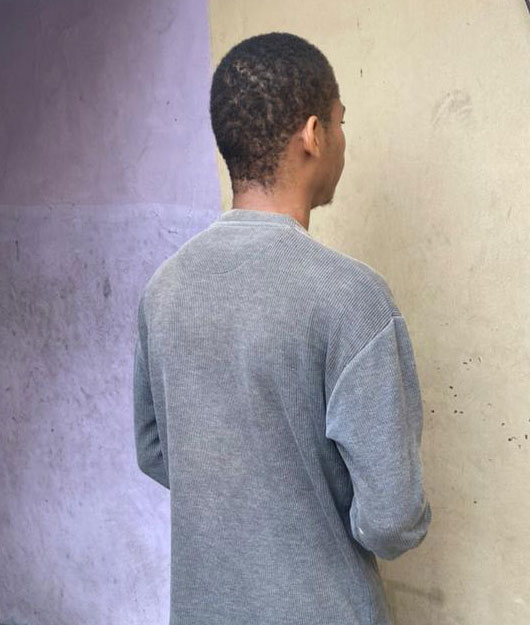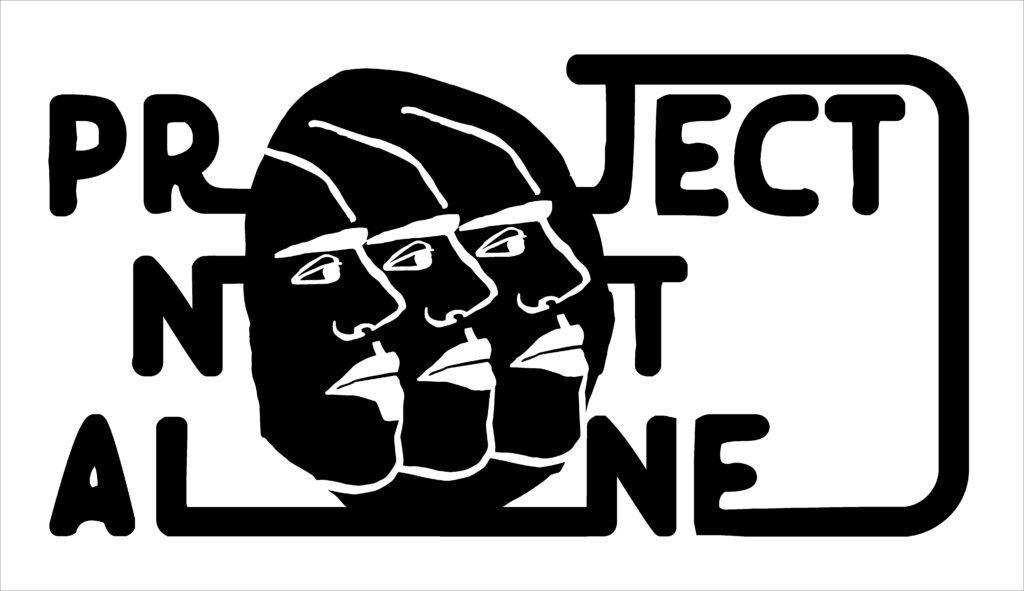
Newly liberated from prison, Benjamin poses for a photo without revealing his face. (Photo by Mike Daemon)
Benjamin had a promising future. Dreaming of becoming a journalist and busy in a budding career as a dance instructor, the 23-year-old Nigerian never imagined that his sexual orientation would land him in prison and shatter his ambitions.
His story exposes the grim reality faced by the LGBTIQ+ community in Nigeria, where homosexuality is criminalized and individuals are subjected to violence, discrimination, and abandonment. In this article, he is identified with a pseudonym for his safety.
In February of this year, Benjamin’s life took a devastating turn. Shortly after completing his secondary school education, he was arrested and imprisoned due to his sexual orientation.
Recalling the ordeal from his tiny room where he now resides after his release from prison, Benjamin still struggles to comprehend the injustice he faced.
“Up until today, I still cannot believe what happened to me. If anyone had told me that I would ever go to prison at this age when I did not steal, neither did I hurt anyone, I wouldn’t have believed it,” he says.
Homosexuality is criminalized in Nigeria, with the federal penal code prescribing up to 14 years in prison for “carnal knowledge of any person against the order of nature.” Certain northern states also impose a penalty of caning, lashes and, at least on paper, death for sodomy. Since 2013, Nigeria’s Same-Sex Marriage Prohibition Act has also criminalized entering into any same-sex amorous relationships as well as organizing or participating in any gay clubs or events.
Benjamin had nurtured dreams of studying mass communication and becoming a journalist. But his aspirations were abruptly derailed after a police raid at a friend’s birthday party.
“Everything was going so well,” he recalls. “When my [test] results came out, my hopes were high. But now, I don’t know where my life is going anymore without anyone’s help.”
Before the arrest, Benjamin worked as a ballet instructor at a small rural dance school, earning a modest income. Despite the challenges, he remained optimistic and focused on building a better future. However, after the raid, his life spiraled into chaos. The police arrested Benjamin and eight others. They seized his phone, discovering his involvement in gay WhatsApp groups, which led to his interrogation and a forced confession about his sexual orientation.
Upon learning of his arrest, Benjamin’s parents disowned him, leaving him alone to face the police and a legal system that criminalizes homosexuality. After a week in custody, he was formally charged with offenses under Nigeria’s anti-homosexuality law, including the prospect of up to 14 years in prison. Isolated and desperate, Benjamin’s case seemed hopeless — until friends and advocates stepped in.

Logo of Project Not Alone (Otavio Zuni illustration courtesy of the artist)
His story circulated on social media, catching the attention of NoStringsNG, an LGBT media advocacy platform. With support from the Saint Paul’s Foundation for International Reconciliation, Benjamin’s case was added to the list of nine imprisoned victims of African homophobia whom the foundation’s Project Not Alone initiative would seek to set free in 2024.
Project Not Alone publicizes prisoners’ stories on the Erasing 76 Crimes news site and appeals to readers to donate money to pay their fines. In Cameroon, that qualifies them for early release. In Nigeria, the prospects for convicted homosexuals is more grim. But at that point, although Benjamin was incarcerated, he had not yet been tried and convicted.
Project Not Alone estimated that, if it was successful, setting Benjamin free would cost $3,200, including $2,150 for fines, court costs and filing fees; plus transportation costs so Mike Daemon could visit him in prison; and food to supplement the prison’s grim fare.
Despite support from Project Not ALone, Benjamin’s journey to regain his freedom was far from easy. Remanded in Port Harcourt prison for seven months, Benjamin faced harsh conditions that harmed his physical and mental health.
“I became extremely sick from sleeping without a mosquito net, poor hygiene, and bad water. I was diagnosed with typhoid, malaria, and pneumonia,” he recounts.
The physical toll was compounded by relentless abuse that he endured from fellow inmates and even prison wardens.
“People can be so wicked and mean. They kept cursing me, calling me names. I was mocked and avoided like a plague — all because they heard I was gay,” Benjamin says.
In August, Benjamin was finally released after paying a fine — lower than expected, thanks to a helpful lawyer — but his freedom came with a caveat: the magistrate mandated that he undergo three months of psychological evaluation.
Overall, to set him free, Project Not Alone paid a total of $2,630, covering Benjamin’s fines and getting him temporary housing and the mandatory counseling.
Now, despite being out of prison, Benjamin remains heartbroken and sick, feeling abandoned and uncertain about his future. “It’s like my life took several turns backward. Here I am, with no family and no one to help me. I feel so alone and abandoned.”
Efforts to reconnect with his family have been unsuccessful, leaving Benjamin in a precarious situation. With the support from Project Not Alone, he secured temporary accommodation and some food supplies, but his long-term prospects remain uncertain. Benjamin remains grateful for the help he received from generous donors through Project Not Alone.
He is looking for a way to earn his living. He also hopes to return to school.
“The country is hard, and I don’t want to be a liability,” he says.
Benjamin’s story is a stark reminder of the challenges faced by LGBTIQ+ individuals in Nigeria, where the criminalization of homosexuality continues to destroy lives. His experience highlights the urgent need for advocacy, support, and legal reform to protect vulnerable individuals from persecution and offer them a chance at a dignified life.
Mike Daemon, the author of this article, is the founder and publisher of NoStringsNG, Nigeria’s #1 media platform committed to advancing LGBTIQ+ equality and providing resources for Nigeria’s LGBTIQ+ community.
Source: African Human Rights Media Network member Erasing 76 Crimes.
COMMENTS